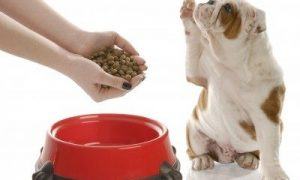“This post contains affiliate links, and I will be compensated if you make a purchase after clicking on my links.”
One of the common problems that dog owners face in caring for their dogs is a food allergy. While some people immediately panic if they see their pets start itching, others seem to show no apprehension at all. To help you make more informed decisions about the kind of food to give your pooch, study the key points below.
What You Need to Know
· Food allergy is rare. There is only a 1 in 100 chance that your dog will develop a food allergy. Among all the various types of dog allergies, hypersensitivity to food is found to be the least common; ranking after flea and inhalant allergies.
· Food allergy takes time to develop. It is very uncommon for puppies aged below seven months to have a particular kind of food allergy. Normally, it takes six months to one year of eating the same dog food over and over again for a pooch to develop an allergy to it.
· Allergy symptoms do not include vomiting and/or diarrhea. Indications of any dog allergy mainly take on the form of itching as demonstrated by scratching, chewing, rubbing of the face, biting of the axilla, groin, or base of the tail, licking of the paws, and development of red inflamed eyes and skin or ear infections. Vomiting, diarrhea, and regurgitation, on the other hand, are symptoms of gastrointestinal problems generally resulted from food intolerance, which is a totally different thing. It has nothing to do with allergy, and it only means that a particular or a combination of food does not agree with your pooch’s digestive system.
· Dogs are allergic to a specific food. If your dog has a food allergy, this means that he is sensitive to one or more particular ingredients; not to all of the constituents of a certain food. The most commonly identified food allergens for canines are chicken, beef, wheat, corn, and soy. If your pooch is allergic to chicken, he would be showing signs whether the chicken’s cooked or not. It is the specific combination of proteins in a food that triggers a dog’s allergic reaction; not the brand of dog food or the way of cooking.
· There remains no reliable medical test for food allergy in dogs. Blood testing has not been proven to be accurate in food allergy diagnosis in dogs, and scratch tests are never done for foods. The only reliable way to determine whether or not your pooch has a food allergy is to perform food trials. This means eliminating chicken, beef, corn, and wheat from Fido’s diet and then feeding him a restricted regime using protein-based alternate nutriments such as fish, duck, or venison, usually mixed with potatoes or rice, for about three months. The diet consists of everything that your dog consumes; including all his food treats. If his allergic symptoms go away, you may start adding chicken or beef back in gradually till you can clearly identify what particular allergens your dog is sensitive to.















Sarah
Sep 15, 2017 at 4:11 am
Please be careful about making absolute comments. It's because of blogs like this that it took us so long to find out my puppy had food allergies.
When my pup was only 12 weeks old, he started itching like mad, especially his ears. But there weren't any obvious skin issues and the vet assumed it was just environmental allergies. Since he was too young to give Benedryl, he just had to suffer.
At 16 weeks he started vomiting almost daily. Three vets said it had to be acid reflux, because "he's too young for food allergies". By six months he was still vomiting almost daily despite our anti-acid treatments, three sets of xrays, an ultrasound and an endoscope. He was still itching ALL the time, and pawing at his mouth/rubbing it on the sofa. Drooling. Smacking lips. Everything kept getting worse.
Finally, at 6 months a new vet suggested food allergies. She said he had hives in his ears and she suspected that since the symptoms were escalating, that food allergies were top of her list because that doesn't happen as markedly with seasonal environmental allergies. I kind of dismissed her because of what I'd read on blogs like this and what other vets said.
But I agreed to a food trial because I was at my wits end. The next day, we started on a Natural Balance fish – single protein and single carb. We did a hard-switch (no transition).
He didn't vomit that day. Then he didn't vomit the next day. Or the next. Three days in a row? I thought it was a coincidence. Then it was a week. Then the hives started disappearing. Then we crossed week two, no vomiting, face rubbing stopped. Week three – no vomiting, lip smacking stopped and we dropped the Pepcid. Then week FOUR. Still no vomiting.
It was incredible. My pups coat started looking shiny again and he was happy.
At six weeks in we decided to try to add another protein. We tried venison (same brand), something he'd never eaten. 15 minutes after feeding him a handful of kibble, he vomited. Which was weird because I know they can't be allergic to something they've never had. Then he itched all day and by afternoon the hives were back.
So I created a spreadsheet of all the ingredients in each of the two foods, plus the one he'd been on during the long months of vomiting (Prescription I/D) and the food he was on when he first started vomiting (A Merrick kibble).
Lo and behold, there was ONE ingredient that was in all of the foods except the Fish. PEAS. Pea protein!
After six more weeks of testing, we have determined he's massively allergic to peas of any kind. Which makes it very hard to find grain-free food (most have peas). I just lucked out with the first new food I tried. Now I'm trying to find a non-limited ingredient grain-free food, but plan to introduce it slowly.
Anyways, my point is that food allergies can apparently form at early ages. My vet said she's seen it a few times when a young puppy has an early bout with anything causes gastrointestinal distress (mine had giardia at 8 weeks). Scientists don't know why this is except maybe the inflammation from enteritis makes it easier for food elements wreak havoc.
If a dog has skin issues and vomiting, they very well may be linked to food and don't let age make you wait on doing a food trial.
Barb Kohl
Sep 9, 2014 at 1:36 am
Most foods that dogs have problems are the kibbled foods that are extruded, and cooked at very high temperatures,, killing all amino acids, Omega 3’s etc and then are coated with fat and flavoring so the dog will eat them. Dog foods that are cooked long and slow, and vacuum cooked will have much less of a reaction with the dogs system. Bil-Jac is one of these foods.
Jessica
May 17, 2014 at 10:49 am
We have a dog with food sensitivity issues. Had been doing the food trial for over 3 months with Royal Canin Hypoallergenic food that was running us $150/month (GSD’s like to eat!) and saw no results. Took him to another vet who did allergy testing-his main issue was green peas, which is what is used in most Grain-Free food. Switched him to a different food and all issues cleared up. Sometimes it’s not the protein in the food that is causing the problem.
melissa
Oct 8, 2014 at 9:28 pm
Can I ask what food you put him on. I also just discovered the pea allergy and its in just about every food.. Thanks
Ann
Mar 27, 2019 at 3:54 pm
I’m interested in reading comments … yet Vet feels the food allergy syndrome has been blown out of proportions.
Mona Sterling
May 14, 2014 at 1:56 pm
I work for a company that specializes in foods for dogs and cats with allergies and food intolerances. We just wrote an e-book that has good information about the link between foods and skin conditions/allergies. addictionfoods.com/promo/ebook-8-signs-your-pet-needs-a-new-diet/
We make foods using novel proteins like kangaroo, brushtail, venison and eel and we’re happy to answer your nutrition questions and help you find a food that works.
Send us an email if you’d like more information or some help figuring out what foods might work for your pet!!
-Mona
Marie Reynolds
Jun 29, 2013 at 6:51 pm
Have you tried home cooking? By cooking it yourself, you know exactly what is being fed. Fresh food is always better than packaged food with additives and preservatives. Keep in mind that most vets don’t know a lot about nutrition, so you would have to do your own research. Try to find a group on feline nutrition. It isn’t difficult and you will find it needn’t be intimidating. I’ve been cooking for my four Bichon Frises for about five years. Good luck!
Linda Hanson
Jun 11, 2013 at 10:56 am
My cat has skin allergies. Have been trying to get it under control.Tried a no grain diet. Did not work. Tried Hills Ultra allergy free cat food. She would not eat it. Now she is on Hills D/D Venison and green pea. Hoping this will work. Any advice PLEASE!? THANK you, Linda
Immuneiq
Jul 13, 2013 at 3:51 am
Hi Linda I am sorry to hear about your cat’s skin allergies… Are you still struggling with this issue? If so, I can reply to you here or faster via email if you still need help, at answers@immuneiq(com) – Cynthia